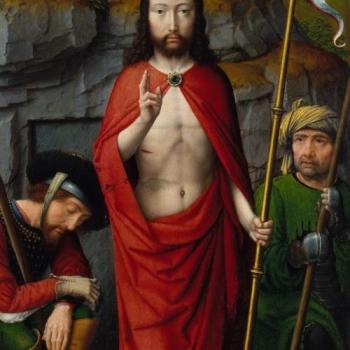You will often see inspirational posters of a verdant mountain scene with the words of Psalm 121 overlaid on the picture saying:
I will lift up mine eyes to the hills
from whence cometh my help.
It has a lovely Old Testamenty kind of lilt to it, coming as it does from the King James translation, the only great work of literature ever written by a committee.
The trouble is, it communicates the exact opposite of what the psalmist is saying, because it leaves out the question mark at the end that established this line as a rhetorical question. This is one of the many reasons there was eventually a Revised Standard Version of the Bible, to fix the little boo boos of the KJV. Here is a much better translation, from the RSV-CE, that takes into account what hills (aka “high places”) meant to the ancient Jewish mind:
I lift up my eyes to the hills.
From where does my help come?
My help comes from the LORD,
who made heaven and earth.
In other words, “See all those high places? Those shrines to Baal on the hilltops dotting the geography all over Judah and Israel where half-paganized Jewish country folk and the pagans living among us (as well the as pagans outside Israel and Judah) worship the various Baals and other fertility deities? My help does not come from them. My help comes from the one God of Israel who made every hilltop and everything else in the universe.”
Jewish cultic worship (like all semitic cultic worship of the time) thought a good shrine should always be on a hilltop (closer to heaven). But in biblical worship there was only one hilltop for that: Mt. Zion, where the Temple was located. Other cultic centers on other hilltops were not devoted to the worship of the God of Israel, but to Baals: fertility deities that half-hearted Israelites also honored on the off chance that they could hedge their bets if the God of Israel did not come through with a good harvest or safety from enemies or a wife that produced children. The long labor of the prophets was to try to get Israel to stop this dalliance with idolatry and worship of false gods. Psalm 121 is part of that effort.
He will not let your foot be moved,
he who keeps you will not slumber.
Behold, he who keeps Israel
will neither slumber nor sleep.
Translation: “Remember the story of Elijah’s conflict with the prophets of Baal and the way he taunted them? ‘Cry aloud, for he is a god; either he is musing, or he has gone aside, or he is on a journey, or perhaps he is asleep and must be awakened.’ (1 Ki 18:27). Baal worship is for suckers. There is only one God. Trust him, not these idols.”
The LORD is your keeper; the LORD is your shade on your right hand.
The sun shall not strike you by day,
nor the moon by night.
The idea here not “You will not have sunstroke if you worship the God of Israel” but rather that the sun and the moon–regarded as gods or heavenly powers by the nations around Israel–will be powerless against you as Ra was powerless against the God of Israel in the Exodus if you will only trust God. The psalms are written in a mental universe that no westerner has taken seriously or even thought about for a thousand years. It is the same mentality the author of Job describes when he says:
If I have looked at the sun when it shone,
or the moon moving in splendor,
and my heart has been secretly enticed,
and my mouth has kissed my hand;
this also would be an iniquity to be punished by the judges,
for I should have been false to God above. (Job 31:26–28).
Job is saying “There is nothing to adore in the sun or moon and if you do so you are insulting God.” The psalmist is saying “There is nothing to fear from them either. Whatever they are, they are merely God’s creatures and servants, not gods themselves.”
The LORD will keep you from all evil;
he will keep your life.
The LORD will keep
your going out and your coming in
from this time forth and for evermore.
Finally, the psalmist, being a good Israelite, refers the reader back to the one and only transcendent God who will protect the son and daughter of Israel from the many mysterious powers in the world who both tempt and threaten with their visible display of power, beauty, mysterious glory, and terror.
Psalm 121 is psalm against idolatry, not a psalm about the glory of nature. It is, in fact, warning against nature worship. It stands in the overall framework of the theology of Genesis, which does not make the gnostic blunder of declaring creation evil and God alone good, but instead sees nature as the good, but derivative, creature of a good God. It not a sentimental Wordsworthian meditation on the splendor of mountain scenery, but a stark challenge to the rival fertility cults that plagued Judah in the centuries before the Babylonian Exile.











